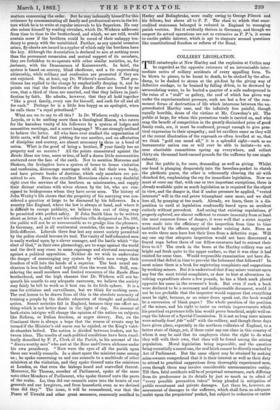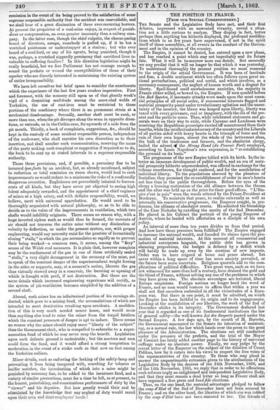COT,T,TF,RY LEGISLATION.
catastrophe at New Hartley and the explosion at Cethin may
be regarded as the opposite extremes of an interminable inter- mediate series of colliery accidents of every appalling form. To be blown to pieces, to be burnt to death, to be choked by the after- damp, to be dashed to atoms at the pit-foot by the giving way of defective cordage, to be brained by falling de'bria, to be drowned by accumulating water, to be buried a quarter of a mile underground in the ruins of a "stall" or gallery, the roof of which has given way under the superincumbent pressure, such are but a few of the com- monest forms of destruction of life which intervene between the un- precedented Hartley case, and the infinitely less painful, though equally horrible, doom of the victims at Mr. Crawshay's pit. The public at large, for whom this precarious trade is carried on, and who reap the benefit of competition in the greatly diminished price of good family coals, are, it must be confessed, prompt enough to give prac- tical expression to their sympathy; and let cavillers sneer as they will at the recent illustration of the reproach so often levelled at us, that we think "gold can mend all," it is a splendid sight—such as no bureaucratic nation can or will ever be able to imitate—to wit- ness charitable committees spring up everywhere, and collect thirty-six thousand hard-earned pounds for the sufferers by one single calamity.
But the public is, for once, demanding as well as giving. Whilst one hand is plunging desperately into the breeches-pocket to clutch the plethoric purse, the other is vehemently cleaving the air with clenched fist, emphasizing the cry for immediate legislation. Now we must at once say that, with one or two important exceptions, there is already available quite as much legislation as is required for the object in view, and the danger is, that if undue pressure be applied, "vested interests" will in the end prove triumphant once more, and we shall lose all, by grasping at too much. Already, we learn, there is a dis- position to cavil at legislation confessedly based upon an accident entirely without precedent. And seeing that existing regulations, if properly enforced, are almost sufficient to ensure immunity from at least the most common forms of danger, it were well that a strict inquiry were made into the efficiency of the inspection from time to time instituted by the officers appointed under existing Acts. Even as we write three men have lost their lives from a defective rope. Will any one say that adequate inspection would not have discovered a frayed rope before three of our fellow-creatures had to entrust their lives to it? The crack in the beam at the Hartley colliery was not bright and fresh quite to the upper surface, so that it was clear it had existed for some time. Would responsible examination not have dis- covered that defect in time to prevent the holocaust that followed? In most mines there is a book for registering complaints and suggestions by working miners. But it is understood that if any miner venture upon any but the most trivial complaints, or dare to hint at alterations in- volving expenditure above a few pounds, he has a black mark placed opposite his name in the overseer's book. But even if such a book were declared to be a necessary and indispensable document, would it not be too probable that the inspector would suppose that everything must be right, because, as no miner dares speak out, the book would be a succession of blank pages ? The whole question of the position of the miner, and his right to insist on certain improvements which his practical experience tells him would prove beneficial, might well oc- cupy the labour of a Special Commission. It is not so long since miners were actually bond fide" sold" with the colliery, and though those days have given place, especially in the northern collieries of England, to a better state of things, yet, if there exist any one class in this country of whom it may be said that its employers claim the right to do what they will with their own, that class will be found among the mining population. Moral legislation being impossible, and the question being essentially a moral one, the real hitch cannot be directly reached by Act of Parliament. But the same object may be attained by making mine-owners comprehend that it is their interest as well as their duty to attend to practical suggestions from thoroughly experienced men, even though these may involve considerable =remunerative outlay. Till then, fatal accidents will be of perpetual occurrence, each differing from its predecessor in its details by just so much as to admit of "every possible precaution taken" being pleaded in mitigation of public resentment and private damages. Let there be, however, an assessment of damages to the sufferers, which shall form an adequate mulct upon the proprietors' pocket, but subject to reduction or entire remission in the event of its being proved to the satisfaction of some supreme responsible authority that the accident was unavoidable, and we shall hear of a great diminution of these ever-recurring horrors. At present the proprietor of a coal-mine enjoys, in respect of punish- ment or compensation, an even greater immunity than a railway coin- Reny. In the latter case, though the chief culprits, the cheese-paring board of directors, escape, somebody is pulled up, if it be but a wretched pointsman or understrapper at a station; but who ever heard of a coal-lord, or any of his agents, being punished, though it was, perhaps, a wretched niggardly parsimony that sacrificed lives in- valuable to suffering families ? In this direction legislation might be really beneficial, but we fear Parliament has not courage enough to sound the pockets or wound the susceptibilities of those of their ntumber who are directly interested in maintaining the existing system of entire irresponsibility.
We have left ourselves but brief space to consider the enactments which the experience of the last few years renders imperative. First and foremost, with the memory still upon us of that ghastly week's vigil of a despairing multitude among the snow-clad wolds of Yorkshire, the use of cast-iron must be restricted to those portions of the machinery where there is no permanent strain at a mechanical disadvantage. Secondly, another shaft must be sunk, or more than one, when the pit diverges along the seam in opposite direc- tions, or extends, as in the Cethin case, for upwards of a mile from the pit month. Thirdly, a book of complaints, suggestions, &c., should be kept in the custody of some resident responsible person, independent of the coalowner, who shall exercise his own discretion as to their insertion, and shall number each communication, reserving the name of the party making such complaint or suggestion if required so to do, the book to be sent up at stated intervals to a supreme responsible authority.
These three provisions, and, if possible, a pecuniary fine to be incurred ipso facto by an accident, but, as already mentioned, subject to reduction or total remission on 'cause shown, would lead to such improvements as would reduce to a minimum the risks of a confessedly dangerous avocation. Englishmen are proverbially inimical to bureau- crats of all kinds, but they have never yet objected to seeing high talent adequately rewarded, and the appointment of a chief engineer of mines at a high salary, and with definite responsibility, would, we believe, meet with universal approbation. He would need to be thoroughly acquainted with natural philosophy, so as to be able to decide as to the value of the improvements in ventilation, which two shafts would infallibly originate. There seems no reason why, with a huge inverted siphon such as would thus be formed, the currents of air should not traverse the entire mine without any diminution of velocity by deflection, as -under the present system, nor, with proper engineering, would any necessity exist for the practice of hermetically closing "stalls," in which the gas accumulates so rapidly as to prevent their being worked—a common case, it seems, among the "fiery" seams of the Welsh coal measures. It is plain that, however complete may be the confinement of the gas in one of these artificially sealed "stalls," a very slight derangement in the economy of the mine, not to speak of the constant danger of the superincumbent weight forcing in the sides or supports, may, at a moment's notice, liberate the gas thus virtually stowed away in a reservoir, the bursting or opening of which is fraught with peril, if not destruction. But these are the mere details which increased engineering experience will rectify, as the system of pit-ventilation becomes simplified by the addition of a second shaft.
Abroad, each miner has an infinitesimal portion of his earnings de- ducted, which goes to a mining fund, the accumulations of which are intended to meet destitution resulting upon accidents. A modifica- tion of this is very much needed nearer home, and would more than anything else tend to raise the miner from the torpid fatalism which the constant presence of danger is apt to induce. There seems no reason why the miner should enjoy more "liberty of the subject" than the Government clerk, who is compelled to subscribe to a super- annuation fund of which he may never reap the benefit. Legislation upon such delicate ground is undesirable; but the masters and men could form the fund, and it would afford a strong temptation to moderation in the event of a strike such as that now on foot among the Yorkshire colliers.
Minor details, such as enforcing the locking of the safety-lamp and preventing it from being tampered with, searching for tobacco or lucifer matches, the introduction of which into a mine might be punished by summary fine, to be added to the insurance fund, and a variety of similar precautions, must for a time be left, as at present, to the honest, painstaking, and conscientious performance of duty by the "viewer" and his deputies. But how greatly would their zeal be stimulated by the knowledge that any neglect of duty would recoil upon their own and their employers' heads !































 Previous page
Previous page